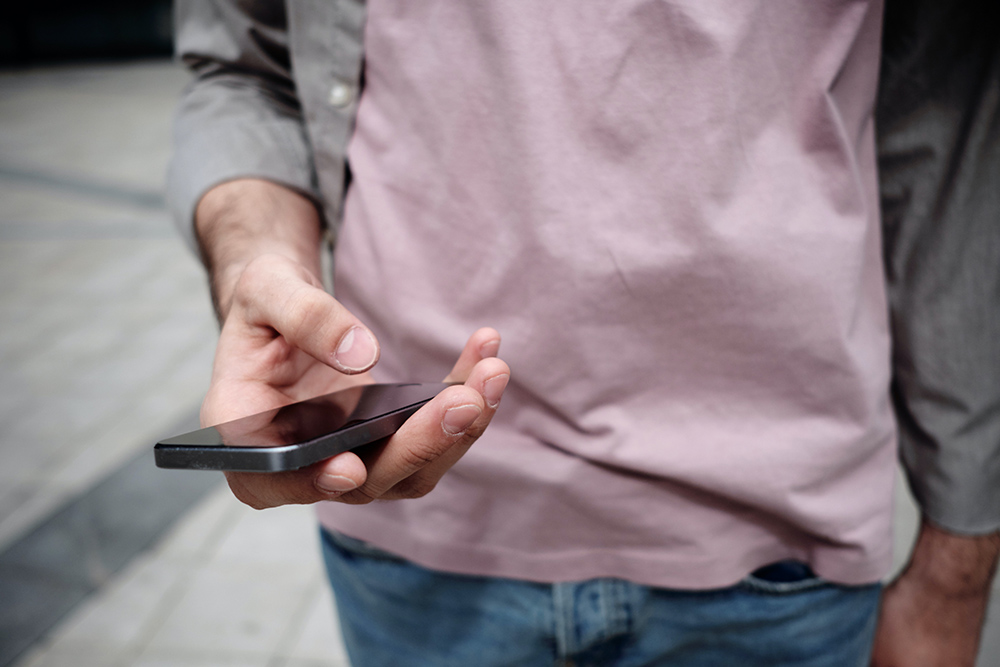
(Unsplash/Clique Images)
With every major societal change and technological innovation comes growing pains, and something as paradigm-defining as the advent of social media is no exception.
Think about it — not only do you have the near entirety of human knowledge contained within a small rectangle that fits in your pocket — but now you can connect with the majority of every currently living human being in the world, at the tap of a screen. Of course, such a prospect is overwhelming.
In light of that, one could almost understand why some people, particularly a small but vocal minority of young adults who do not know a world without the internet, might want to cut the cord and swear off social media.
However, I was deeply disturbed to read about a new scholarship at the conservative Franciscan University of Steubenville, Ohio, that encourages the practice of unplugging, to the tune of $5,000.
It's not that idea of unplugging that disturbs me, nor is it the notion of needing a break from the constant bombardment of advertisements, political hot takes and disingenuous influencers. Instead, I am dumbfounded that an institute for higher learning would actively encourage its students to accept fear over knowledge, to run away and hide from the world, and to cede social media to the problematic forces of greed and narcissism that currently inhabit it.
Unless every student in the program is going into cloistered religious life, sooner or later, they will be confronted with the realities of digital media. When they do, they may find that they are unprepared for life in the modern age.
I do not doubt the problematic aspects of smartphones and social media brought up by the students: Constant notifications make it hard to focus on the present moment, algorithms force us into thought bubbles of confirmation bias, and social media anonymity can tempt even the best of us into saying unkind things online.
Shouldn't a college, particularly a Catholic school, prepare its students to use these tools sustainably and faithfully, rather than encourage them to retreat back into the metaphorical cave?
Taking a sabbatical from smartphones could be a helpful way for the students at Franciscan University to focus on their studies and be more present to the short, fleeting years of college. But it can also be a coping mechanism of avoidance, encouraging students to hide away from or, worse, demonize the realities of the digital world.
Unless every student in the program is going into cloistered religious life, sooner or later, they will be confronted with the realities of digital media. When they do, they may find that they are unprepared for life in the modern age.
Instead of offering an "Unplugged Scholarship," wouldn't it be more effective to offer digital media classes, teaching students how these platforms work, what some of their more sinister or ulterior motives are and how to navigate them? What about a class on how these platforms are being used for good, for community, for inclusivity; and how Catholics can be the definitive models for that behavior?
It seems trendy to blame social media for the major problems of society — the rising rate of mental illness in young people, the increase of violence and the proliferation of hate groups, to name a few. No doubt social media has contributed to shedding light on these real and pressing challenges.
Even our government has selected social media to be the boogeyman du jour. Four senators introduced a bipartisan bill on April 26 that would, among other things, prohibit kids under 13 being on social media, require parental consent, and prohibit algorithms for kids age 13-17.
This is not going to work — and not just because teenagers know their way around the internet better than you or I. This isn't going to work in the long term because it's an abrogation of personal responsibility on every level. An outright ban doesn't encourage parents to teach, model or practice sustainable social media use. A ban doesn't hold big tech accountable for their platforms and put the onus on multibillion dollar corporations to change. Banning children doesn't prevent the expansion of hate speech.
Advertisement
A ban doesn't solve the problems ailing social media, it exacerbates them and it sets our kids up for failure. If no meaningful change comes to Facebook, Twitter, Instagram, TikTok or YouTube, kids will arrive on them at 17 unprepared, uneducated and vulnerable.
What's worse, the proposed law is effectively an acknowledgement that social media is an inherently bad thing, and it removes it as a tool to reach people, peacefully organize, form community and interact with the world.
Digital media is a gift from God. It offers opportunities for encounter, accompaniment and evangelization. It allows us the opportunity to get outside of our comfort zone and confront the lived realities of others in different cultural or economic settings. It allows us to help someone experiencing tragedy, or celebrate another's triumph. It offers opportunities for connection and communion.
Blaming social media or smartphones for society's or the church's problems is akin to blaming an MRI machine for a cancer diagnosis or a flashlight for shedding light on our challenges. It is an easy way to diffuse responsibility to a faceless entity, shift blame to the whistleblower and not look in the mirror and say, "I am part of the problem."
Social media is not responsible for the vitriol of Catholic Twitter — Catholic tweeters are. Streaming Mass on Facebook is not the reason people aren't going to Mass — uninspired liturgy, poor homilies and unwelcoming clergy are. Smartphones are not the only reason teenagers are experiencing an increase in anxiety — crippling societal angst about a half dozen issues like climate change, gun control and income inequality are responsible.
Social media and smartphones are not the problem — the way we behave on them is. It's time we took ownership of that, took a step back and learned how to use these tremendous gifts in service of our common mission as Catholics and fellow humans.
Social media is a vocation that not everyone is called to, but that conclusion can only be arrived after careful discernment. Instead of running away from social media, and unplugging from smartphones entirely, as the students are being encouraged to do at Franciscan University, we need to learn how to live with and effectively use these tools.








